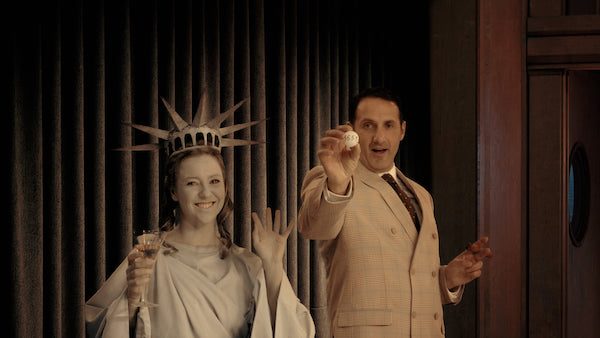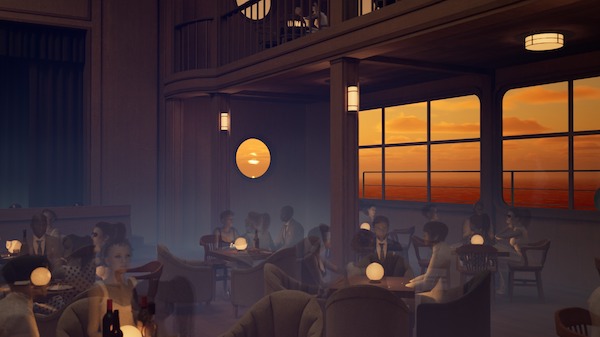Theater Review: “Witness” — An Antique Virtual Voyage
By Bill Marx
By all means, explore history’s tragedies on stage — virtual or otherwise. But always keep a sharp, invigorating eye on the present’s tragedies-in-the-making.
Witness by Nana Grinstein with Blair Cadden & Igor Golyak. Conceived and directed by Golyak. Scenography & costume design by Anna Fedorova. Staged by the Arlekin Players Theatre and Zero Gravity (zero-G) Virtual Theater Lab, a live virtual offering (that includes a post-show talkback with members of the cast and creative team), through January 23, 2022.

A scene from Witness: Darya Denisova as Lady Liberty and Gene Ravvin as the Emcee
The adage holds, whether the bottles are new or virtual. It’s still the same old wine.
Witness struggles to be more than a musty historical drama. It does not succeed. The most newfangled element in this world premiere production is that it is a work of virtual theater, but even an infusion of techno bells and whistles can’t save the evening from feeling somewhat stale. The Arlekin Players Theatre was inspired by the real life voyage of the German liner “St. Louis, which left Hamburg in 1939 with over 900 Jewish people on board and headed to Cuba only to be turned away, leaving the passengers stranded with nowhere to go and no escape.” The company has sure instincts: given the alarming rise of anti-Semitism around the globe, particularly in the United States, the boat’s fate is a political/moral disgrace that is well worth remembering. But those familiar with the mountains of literature about the Holocaust won’t find much here that hasn’t been heavily underlined many times before. More importantly, historical events should be dramatized so that they illuminate today’s turbulences, in this case the current global immigration crisis.
What realities in 2021 could Arlekin draw on to reenvision the past? A recent piece in the New Yorker reported that xenophobic EU countries are diverting immigrants from Africa into “brutal Libyan detention centers run by militias.” And there are coming attractions courtesy of climate change: scientists have determined that rising seas and storm surges could, by 2060 or 2070, flood areas inhabited by 275 million people worldwide, 80 percent of them in Asia. Masses now and in the future will be forced to move because their homes will be uninhabitable. The developed nations have created an environment that will leave many who live in the poorer nations no choice but to leave — their cities, towns, and villages will be underwater, their arable lands no longer capable of sustaining life. At some point, our theaters are going to have to turn their attention to what this massive displacement will do to civilization. How many prisons will we need to pay other countries to build and maintain?
In the face of the emergency posed by immigration, Witness feels safe and dated, though there are some ineffective, halfhearted attempts to explore a few of the questions raised by the passengers’ predicament. The show’s 90 minutes are split into three distinct parts. The first is the most affecting. In the present, we are greeted by an Emcee (an overwrought Gene Ravvin) — a lounge lizard who initially refuses to deal with (or even admit) the political relevance of the St. Louis’s voyage. He transports us back to the past, where he is the host of a talent show performed on the stage of the St. Louis in front of an audience of bland-looking manikins. These semi-allegorical acts are inspired by the horrific experiences of the Jewish immigrants (most memorably Kristallnacht), and they are performed, generally with artful panache, by members of the Arlekin Acting Company, many of whom are Russian immigrants. At their best, these routines have a compelling imagistic power. My favorite features a woman who has accepted the responsibility of boiling books — we see close-ups of pages of text undulating in her pot. Still, some of the heavy-handed figures (such as Darya Denisova’s hammy Lady Liberty) reminded me of the two-ton symbols in Katherine Anne Porter’s Ship of Fools. For an inexplicable (perhaps satiric?) reason, the “real” audience members, whose images can be glimpsed collectively at the back of the stage on occasion, are asked to vote for their favorite performers and a winner is announced. Is the intention to create a tragicomic video game?

Hanging out with the nondescript audience members on the virtual liner St. Louis in Witness.
After the talent show, the genre moves to radio play. The screen goes blank and we hear (through a nicely edited surround-sound segment) about the arrival of the St. Louis in Havana, where it is promptly turned away, pleas that the ship be allowed to sail to the United States denied. Interlaced with this “you are there” drama are prayers — that are unanswered.
Next comes the weakest part of Witness. We are portentously informed that the ship not only contains Jews from the past, but those in the present and the future. So, as the Emcee wanders around the ship’s passageways (accented by visual allusions to Kubrick’s The Shining?) searching for his son, we are taken into various rooms that host playlets that skip around in time and place. They touch on oh-so familiar debates about a number of thorny issues, ranging from Jewish assimilation and belief to identity. There’s a semicomic wedding ceremony and, worst of all, a (scripted?) bull session among members of the Arlekin company members in which “hot button” concerns are raised and promptly dropped. These discussions never rise above the superficial. We hear (for a moment) about bombardment in Gaza and Israel’s Wall. (I didn’t catch the word “Palestinian,” but I might have missed it). At one point, there’s a critique of the Boston theater community, charging that it reacts publicly when there are acts of prejudice against Asians and Blacks, but not to local reports of anti-Semitism. Most of what we hear has been well chewed over (and over) and much of it feels about 20 years out of date. How about grappling with the growing realization that the two-state solution is dead? There is talk on the Israeli ideological right of “transporting” Palestinians out of the country. Forced migration? Social media (Facebook, YouTube, Twitter, et al.) is not mentioned, even though high tech has become instrumental in mega-multiplying the organizing and financial capabilities of those who hate Jews. How about virtual theater protest — against Meta and its world of viral avatars?
“Who am I? Where am I?” cries the justifiably bewildered Emcee near the end of Witness‘s gabfest. So much for moral clarity. And that is disappointing. During Covid’s first wave, Arlekin Players Theatre and its partner, New York’s Cherry Orchard Festival, saw what kind of drama (among others) the times called for — an assault on those who are abusing power. The troupes staged a Zoom reading of Insulted. Belarus(sia) by Andrei Kureichik, a condemnation of the rise of authoritarianism in Belarus and the courageous struggle for democracy, which continues to this day. Against-the-grain productions like these, from small, independent companies, have become more necessary than ever. For example, many would argue that democracy in this country is in serious danger. But this potential catastrophe has been met (generally) with silence by our theaters. By all means, explore history’s tragedies on stage — virtual or otherwise. But always keep a sharp, invigorating eye on the present’s tragedies-in-the-making.
Bill Marx is the Editor-in-Chief of the Arts Fuse. For just over four decades, he has written about arts and culture for print, broadcast, and online. He has regularly reviewed theater for National Public Radio Station WBUR and the Boston Globe. He created and edited WBUR Online Arts, a cultural webzine that in 2004 won an Online Journalism Award for Specialty Journalism. In 2007 he created the Arts Fuse, an online magazine dedicated to covering arts and culture in Boston and throughout New England.
Tagged: Arlekin Players Theatre, Bill-Marx, Blair Cadden, Igor Golyak, Nana Grinstein

